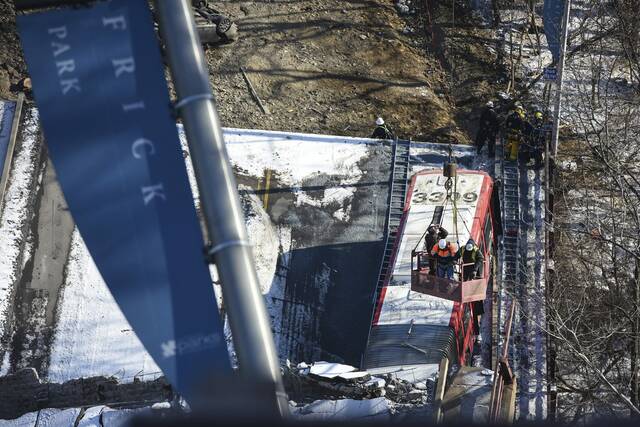Proposals before Pittsburgh City Council to increase focus on the city’s infrastructure in the wake of the Fern Hollow Bridge collapse are drawing mixed reactions from council members.
The first piece of legislation would create a 15-member committee of city officials, construction industry professionals, organized labor representatives and others to make recommendations on short- and long-term investments in city-maintained infrastructure such as bridges and tunnels.
The second measure would require the Department of Mobility and Infrastructure to produce regular reports on the city’s infrastructure, which would be publicly available.
Councilman Corey O’Connor, who introduced the legislation, said Wednesday that he feels the measures would provide “transparency with our infrastructure” and encourage experts to focus more attention on the city’s bridges and tunnels.
“It’s more support for our city’s infrastructure,” he said.
There are over 400 bridges in the city, including between 130 and 140 that are owned by the city, Acting Director of the Department of Mobility and Infrastructure Kim Lucas said.
While Councilman Ricky Burgess appeared to agree that the city’s bridges and other infrastructure need work, he said he didn’t believe the legislation before council would help.
“When we do these knee-jerk reactions, we’re not going to fix bridges this way,” Burgess said. “There is going to need to be a massive amount of government resources to fix these bridges. We, the city, do not have the money to fix the infrastructure. That money’s going to have to come from state and federal resources.”
About $25.3 million in federal funding has been allocated to rebuild the Fern Hollow Bridge.
The proposed committee would not be able to produce the necessary cash to address the rest of the city’s infrastructure needs, Burgess said.
“This is a financial problem, not a policy problem,” he said.
O’Connor said he is coordinating with Mayor Ed Gainey’s administration to find unused funding that can be put towards the city’s infrastructure needs. He also emphasized the importance of bringing experts into the fold and increasing public awareness of the state of the city’s bridges.
“For us to bring experts for support doesn’t hurt anybody,” O’Connor said. “For us to be open and transparent, I don’t know who would argue about that. That seems like the right thing to do.”
Councilwoman Erika Strassburger, a cosponsor of the legislation, said that while City Council can’t fix all of the city’s infrastructure problems, it should aim to do what it can to address concerns after the Fern Hollow Bridge collapse.
Councilman Bobby Wilson said he was concerned that the measures would take DOMI’s resources and manpower away from other pressing issues. Having the department create regular reports on the city’s infrastructure — something already available through PennDOT — could keep them from other projects, he said.
Lucas said the department would likely need to hire additional people for the added workload.
Both pieces of legislation were held for further discussion next week. Council President Theresa Kail-Smith told members during Wednesday’s public meeting that she felt they should be cautious of what they publicly discussed regarding infrastructure matters, as the city may be facing lawsuits.








